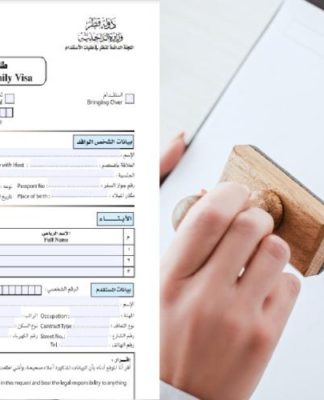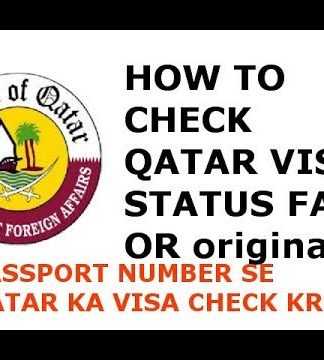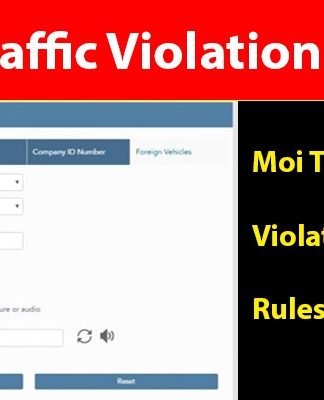
Navin Sam / Doha News
Photo for illustrative purposes only.
In less than two weeks, a new law in Qatar governing expats will come into effect.
The legislation will give “substantial new freedoms and protections” to foreigners working in the country, the government said in a statement last night.
However, for most people, it will be business as usual on Dec. 13 when Law No. 21 of 2015 takes hold.

HIAQatar / Twitter
Hamad International Airport
For example, expats planning to travel for the holidays will still need to obtain permission from their employers before leaving the country, the government said yesterday.
This is despite a previous pledges to set up an automated exit permit system via the Ministry of Interior.
However, there are some big changes to the current law. Here they are, as highlighted by the Ministry of Administrative Development, Labor & Social Affairs.
Who is covered?
This law governs the entry, exit and residency of all non-GCC nationals – including domestic staff, even though they are not covered under Qatar’s Labor Law.
Qataris and nationals from other Gulf countries are exempt.
So are employees of the Qatar Financial Center, which has its own separate laws regarding employment and immigration, according to legal experts.
What’s the process for new hires?
Qatar has long grappled with the problem of “substitute contracts,” in which expats move here expecting to work in a certain job for a specific salary and are then forced to take a lesser position.
To tackle this, this law will require anyone moving to see a copy of his/her work contract in his/her home country.
And work visas will only be issued for contracts that have been approved by the government.
What happens to existing contracts?
Length of service at a company will be calculated from when an employee first started work, not from Dec. 13.
This means you won’t have to sign a whole new contract once the new law takes effect.
How do I change jobs?
Expats on fixed-term contracts can change jobs without employer approval once their contract is completed.
Those on open-ended contracts can switch employers without approval after five years.
However, employees will still need to apply to the labor ministry to switch jobs.

Business2community.com
Photo for illustrative purposes only.
Additionally, the employee must give written notice about a job change to his/her employer before his/her contract is up.
Finally, employees who want to change jobs before their contract expires will still need to get their employer’s permission.
But if a person can prove he/she has been mistreated or exploited by his/her employer, then he/she can petition for a job change, the labor ministry said.
Speaking to Doha News, legal experts said the NOC changes are “good news” for employees whose five-year contracts are about to run out and looking to make a move.
Kamaljit Dosanjh, senior associate with law firm Al Tamimi & Co., said:
“This is the outcome that was predicted by most employers. In fact, some employers who had concerns about mass exits panicked and entered into fresh five-year fixed term contracts with their employees.
The problem… is that it locks in both the employer and the employee – if the employer wants to terminate the contract early, then depending on the circumstances, in the worst case scenario, the employer may end up having to pay the employee for the balance of the unexpired term. We would recommend caution against any knee-jerk reactions like this.”
How do I leave Qatar?
Exit permits still exist. The text of the new law states that expats should apply directly to the government for these.
But yesterday, the ministry clarified that expats must still ask their employer in writing before leaving the country.
What if my employer says no?
If the employer does not agree, the employee can appeal to the new Exit Permit Grievance Committee.
This can be done either online, in person at a government services complex, or at a police station.

Ministry of Interior/Facebook
Photo for illustrative purposes only.
The committee must respond to requests for an exit permit within 72 hours of a complaint being lodged, although it may be sooner, especially in emergency situations.
How does the committee work?
The panel is made up of officials from the Ministry of Interior, MADSLA and representatives from the National Human Rights Committee.
Once a complaint is made, the committee will contact the worker’s employer, who must justify why he denied the exit permit. Valid reasons include believing the employee has committed fraud or is about to evade prosecution for a crime.
The committee will also carry out its own background checks on employees. If it cannot contact the employer, it will grant an exit permit.
Exit permits will only be refused on two grounds – if an employee is wanted in connection with active criminal proceedings, or if he has defaulted on debts in Qatar, the labor ministry said.
What about emergencies?
Workers who need to leave Qatar quickly must still ask their employers for an exit permit.
However, in the event that an employer refuses to grant one, the committee can “expedite the timing” of its decision in emergency situations.
What about family members?
Family members of expats who have been denied exit permits may leave the country freely.
The only exception is if they are implicated in a crime committed by the person under investigation, the ministry said.
What if I want to come back to Qatar?
Expats who have left the country and canceled their RPs may return immediately without waiting two years as was previously the case, provided they have a new work visa.
However, workers who have been found “guilty of misconduct” while working for their previous employer in Qatar will not be allowed to return.
What happens if I lose my job?
Employees whose contracts are terminated while they are in Qatar will have three months to secure a new job.
If they cannot find a job in this time, they must leave the country.
Notably, some of the details provided by the ministry yesterday differ from the wording of the law.
According to legal expert Dosanjh, forthcoming “executive regulations” may amend aspects of the previously published law.






























